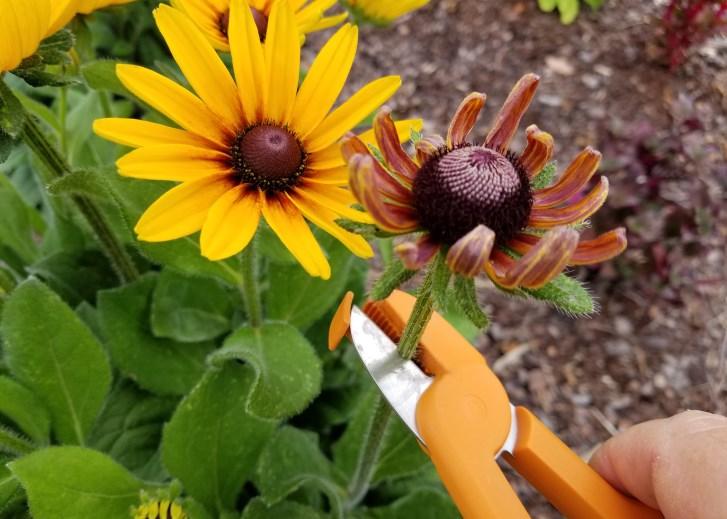
6 minute read
August Gardening Tips
don’t want their inner canopy “cleaned out.”
Hopefully you’re drinking plenty of water in the summer heat. It might surprise you that trees can run short of water. While we tend to think tree roots dive deep in search of a cool drink, 90% of tree roots are in the top 25 cm. of soil, and 98% are in the top 46 centimetres.
Advertisement
Species such as birch, ironwood and hemlock are especially prone to water stress, but others are renowned for their drought-tolerance. Bur oak (Quercus macrocarpa) is a stately, long-lived (800+ years) native tree which oddly enough tolerates intermittent flooding as well. Black maple (Acer nigrum) is very similar to sugar maple, but with slightly fuzzy leaves that are better at conserving water. Hackberry (Celtis occidentalis) is another native tree that can withstand prolonged water shortages. However, even these tough species have their limits.
Lawns recover from severe water shortage in a matter of weeks. Trees, however, take years. Drought stress weakens a tree, making it more vulnerable to diseases and insects. While many shady characters don’t take well to a good soaking, your tree will appreciate a thorough weekly drench. Actually, its survival may depend on it.
Wishing a healthy, hydrated summer on the shady side of town for you and your associates.
(Continued on page 7)
10. Work together to establish a spending plan and make a commitment to keep your spending in line with your plan. With mutual respect and commitment, you and your partner can do wonders.
Adapted for use by Marilyn M. Furry, Ph.D., associate professor of agricultural and extension education, from “Spending Decisions," Extension Service, Iowa State University; and revised by Jane Landis, county extension director, Dauphin County, Penn State Extension. Deadhead perennials to extend the blooming season and encourage plants to direct more energy to their root and shoot systems.
In some special cases, deadheading can even encourage a second bloom later in the season. How to do it properly is determined by a plant’s growth habit and your own preferences. Deadheading perennials isn’t difficult, only time consuming. Although deadheading is specific to each type of plant, all you really need to learn is to cut spent flowers back to a lateral bud or leaf. Only some plants will rebloom after deadheading, but most will be better for it regardless. Also, from an aesthetic perspective, deadheading perennials gives the garden a cleaner, more polished look. Perennials that typically benefit from deadheading include daylily, iris, hosta, peony, Shasta daisy, coreopsis and dianthus.
Stop fertilizing trees and shrubs with high nitrogen sources by the end of the month.
Fertilizing in late summer can cause some plants to put out new growth that is susceptible to frost damage. The best times to fertilize trees and shrubs are in spring before growth starts, or mid-summer after shoot growth ceases, because root growth and maximum nutrient uptake happen at these times. Additionally, put away the pruning tools for now. Late summer pruning may make plants push new growth that is not winter hardy. Roses are particularly susceptible to damage from late season fertilization and pruning. The ideal time to prune most species is in late winter or early spring while plants are still dormant.

Make sure the mower deck is set high, to a height of three inches or more.
Taller grass is more resilient against insect feeding, weed invasion and drought. Mowing high promotes the establishment of a larger and deeper root system, which is more drought tolerant. A larger root mass also makes grass more tolerant of grub feeding, reducing the need for insecticide applications. Taller grass also helps provide broadleaf weed and crabgrass control by shading and cooling the soil surface, equating to less herbicide use.
likely to feel less stressed after a vacation. Mastering a new skill and detaching psychologically from work during vacation also helps to reduce stress levels. The study also found that longer vacations provide more opportunities to achieve these goals, hence yielding greater benefits.
And it may not matter how long the trip lasts. Another study published by Finnish researchers followed nearly 200 people who took winter sports vacations and extended weekend trips. The researchers measured six indicators before, during and after the trips: health status, mood, tension, energy level, fatigue, and satisfaction. People in both groups – those who took weekend trips and longer vacations – reported higher levels of wellbeing before and during the vacation.
In addition to the benefits before and during vacation, there is some evidence that people experience a psychological benefit from recalling the happiness they experienced on vacation during difficult times. Research on memory tells us these types of positive memories can serve as a psychological resource throughout one’s life. Studies also show that vacationing can build relationships. People are more likely to have more and higher quality conversations with the people with whom they vacation. Vacations serve as a bonding experience, and may also help to put life in perspective and improve meaning – factors that ultimately improve psychological resilience.
The take-home message: That upcoming vacation is actually good for you! The evidence shows you’ll feel happy and excited in the weeks leading up to your trip, you’ll have the opportunity to bond with your travel companions and find meaning in your life and the memories of your trip will help bolster your spirits during difficult times ahead.
Source: https://evidencebasedliving.human.cornell.edu/
How pitiful it is to hear a business man say, as business men so often say, "Really I cannot take a holiday this summer; my business ties me so to my desk, and, besides, I am feeling quite well. No, I shall send my wife and children to the seaside, and content myself with a Saturday-to-Monday now and again." We solemnly warn all such foolish persons that they are digging their own graves. Change is absolutely essential to health.
~J. M. Barrie, "Every Man His Own Doctor" Making decisions for yourself is easier than making decisions with a partner or several family members. When talking with a partner about money, follow these suggestions for greater success in making decisions.
1. Understand your own motivation concerning the use of money. You have the right and the responsibility to be clear about the things that are important to you. Do not expect your partner to guess what these things are. Respect and love grow stronger when two people understand each other's needs.
2. Stay calm. Most people get upset and angry when there is a conflict over money. If you are upset, step away until you are calmer, but do not ignore the conflict. Think about what is important to you and ask for time to work through the discussion with your partner.
3. Control distractions. Do not try to talk while watching television or while other people are around. You will not be very attentive or creative with your ideas.
4. Listen, listen, listen. Most of us think more about what we are going to say than about what the other person is saying. This leads to many mistaken assumptions and lack of focus on what your partner is trying to say. Make sure you check back with a statement such as, “I want to make sure I understand. Is this what you are saying?"
5. Recognize each other's feelings. You may forget about the other person's feelings in your own eagerness to explain. Remember your partner has feelings just like you. Never put your partner down or belittle his or her ideas whether you are alone or with other people.
6. Strive to find a win/win situation. After each person has explained what he or she thinks and feels, say, “All right, now how can we work this out so we are both satisfied with the result?"
7. Establish goals together. Dream, talk, consider, wonder, and suggest a whole variety of goals that are important. Then decide together which ones you want to achieve now and which can wait. Develop a plan to reach your goals.
8. Talk about the trade-offs for every want and need.
9. Almost everything worthwhile has a price. When two people agree about the costs, the reward is worth it.





